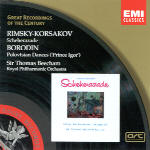Two critics might battle for hours, arguing which Golden Age Scheherazade is best. This one? Reiner’s? Ansermet’s? One of the eclectic, fringe favorites each of us has, such as my preference for Rossi on Vanguard? The truth is that they all have something to offer. This one, resurrected in EMI’s Great Recordings of the Century, chronicles splendid woodwind playing from the Royal Philharmonic’s ace players, not to mention the usual charm, grace, and joie de vivre we would expect from a Beecham reading. Unfortunately, it was not very well recorded, which is surprising, considering that EMI producers and engineers were taping some of the best sound around in the 1950s. But, though this one has singular clarity on top (the triangle and cymbals really “zing”), it is severely lacking in bass and overall impact. The double basses seem in the next county, when they’re there at all, and the bass drum has no power whatever. Things are better in the rousing Polovtsian Dances, one of the best versions in the catalog, now sounding better than ever, with excellent transparency and chorus/orchestra balance. The sound here is still skimpy in the bass, though not as severely as the Korsakov. Like I said, we all can argue Scheherazade’s tale into the late evening, but I keep coming back to Ansermet for both works (the Borodin temporarily out of print, but worth looking for on Decca’s defunct Weekend Classics label). For a more modern recording of each, Temirkanov leads the New York Philharmonic in a full-bodied Scheherazade and Shaw and his excellent Atlanta forces are not shabby at all in their well-recorded Borodin.
































